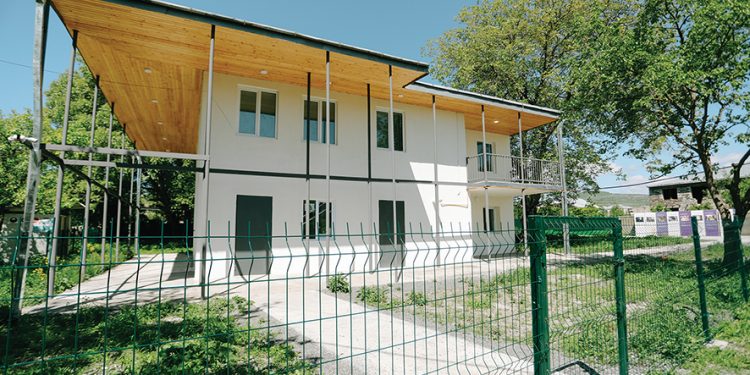The social protection sector of Georgia meets the year 2024 with important news – within the framework of the initiative carried out with the help of the Government of the Czech Republic, persons with disabilities living in large boarding houses in Dusheti and Martkofi municipalities will move to new, family-type homes. This support is part of the large-scale assistance of the Czech Development Agency, which aimed to promote the start of independent living of the beneficiaries under state care and, by working on relevant legislative initiatives, to support the Government of Georgia in the process of deinstitutionalization.
Adults with disabilities will live in a new environment
Even though the deinstitutionalization process for adults with disabilities in Georgia began in 2010-2011, due to its complexity, the process is still ongoing. In 2020, at the initiative of the Ministry of Internally Displaced Persons from the Occupied Territories, Labour, Health and Social Affairs of Georgia and the Agency for State Care and Assistance for the Victims of Human Trafficking, within the framework of a project funded by the Czech Development Agency, Caritas Czech Republic developed a 2023-2030 strategy and action plan for independent living and deinstitutionalization of persons with disabilities which were approved accordingly by the Ministry in 2023.
Experts in the field in close cooperation with their Czech counterparts, and the State Care Agency of Georgia and the Ministry of Health of Georgia, defined the main work directions, assessed the individual needs of the beneficiaries with a complex approach, and prepared the relevant standards. As a result, some of the beneficiaries, who until now lived in the boarding houses in Dusheti and Martkopi, moved to new family-type homes, where each of them now benefits from community-based services.
“In Georgia, the process of deinstitutionalization of large boarding houses and developing appropriate alternative care services has been successfully underway for several years. This process is in its final phase, and the few remaining boarding houses are going through the process of deinstitutionalization. Notably, new alternative care support services have been created, where the beneficiaries of the mentioned boarding houses can continue their lives in an independent environment, according to their interests and wishes,” – notes Tamar Kurtanidze, Head of the Department of Social Protection, IDPs and Labor Policy, Ministry of Health of Georgia.
Importance of the deinstitutionalization strategy and action plan
Maguli Shaghashvili, Caritas Czech Republic’s project expert, tells us that the most crucial part of Caritas Czech Republic’s vision was that the work at the first stage started not with documents but with an assessment of the people living in Dusheti and Martkopi boarding houses – “we had to study their interests, needs, attitudes, and wishes.”
At the initial stage of the project, a multidisciplinary team consisting of psychologists, occupational therapists, social workers, doctors, and psychiatrists was formed. This team worked both with the beneficiaries and with the boarding house staff.
“It was important to understand the attitude of persons with disabilities regarding the change of residence and their respective fears. Unfortunately, many of them ended up in a boarding house right from the maternity home, not because of the family’s economic problems but because of the stigma in society. That is why it would be a big mistake not to look at the process of deinstitutionalization from their perspective. This evaluation showed us how to set up the service properly.”
Initially, Caritas Czech Republic started working on the deinstitutionalization strategy and action plan with the Ministry of Health of Georgia and the State Care Agency of Georgia. Further discussions with the community of persons with disability and service provider organizations continued. As a result of this cooperation, the parties have established a strategy that primarily considers the prevention of institutionalization – what type of support a child, an adult, and their families need in order not to be at risk of institutionalization.
“That’s why we worked with the state to create a deinstitutionalization prevention mechanism that combines local and central government resources. Supportive services are important for prevention. In this regard, the service of a personal assistant, the standards of which have already been approved by the state, is also essential,” – says Maguli Shaghashvili.
Importance of family-type homes for adults with disabilities
At this stage, there is one type of alternative housing for adults with disabilities – small family-type services, in which 5-6 people live. When more people and additional staff are crowded into these types of homes, a structured environment fosters the establishment of institutional care. With this in mind, Caritas Czech Republic with the financial aid of the Czech Development Agency, procured, rehabilitated, and handed over six family-type houses to the State Care Agency to transfer adults with disabilities living in the large boarding houses of Dusheti and Martkopi.
“Deinstitutionalization of large boarding houses is a complex process that requires a lot of effort from all involved parties. The mentioned is not just a physical transfer of institutionalized beneficiaries from large housing to alternative services but a major social transformation, meaning starting a new life and realizing the rights of persons with disabilities, and also systemic changes. To complete this process, to ensure sustainability and irreversibility, it is necessary to strengthen the institutionalization prevention mechanism and provision of alternative and supportive services,” – says Maguli Shaghashvili.
With the support of the Government of the Czech Republic, Caritas Czech Republic has been working for many years to protect the rights of persons with disabilities and provide them with appropriate services. Since 2020, we have been implementing a large-scale initiative within the framework of which we have been supporting the Government of Georgia in the process of deinstitutionalization. The mentioned envisaged the development of appropriate legislation and the provision of family-type homes and services for persons with disabilities under state care.
“Since 2020, Czechia has been supporting the Government of Georgia through our partner Caritas Czech Republic to establish a new national system of alternative social care for adults with disabilities. The main objective was to create conditions for transforming services from large boarding institutions to more convenient and appropriate family-based premises for persons with disabilities. I know that the first clients were already transferred from large institutions, and they are pleased as far as I know. I do hope that the quality of their lives will improve significantly.” – says Jana Zelingerova, the Head of the Development Cooperation, Embassy of the Czech Republic in Georgia.
This material was prepared as part of a project funded by the Official Development Assistance of the Czech Republic and implemented in partnership with the Czech Development Agency and Caritas Czech Republic.
By Nina Kopaleshvili














